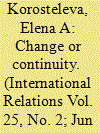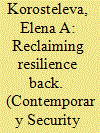|
|
|
Sort Order |
|
|
|
Items / Page
|
|
|
|
|
|
|
| Srl | Item |
| 1 |
ID:
106438


|
|
|
|
|
| Publication |
2011.
|
| Summary/Abstract |
This article examines the discourse of the EU's relations with eastern Europe under the recently launched Eastern Partnership (EaP) initiative. First, it evaluates the EaP's conceptual framework to suggest that there seems to be more continuity than change in the EU's modus operandi with its neighbours. More crucially, the notion of 'partnership', central to the new philosophy of cooperation with the outsiders, continues to be ill defined, causing a number of problems for the effective and legitimate realisation of the European Neighbourhood Policy/Eastern Partnership in the region. Second, drawing on the empirical investigations of the official discourses in Belarus, Ukraine and Moldova, the article reveals an increasing gap between EU rhetoric and east European expectations. In the absence of adequate partnership response to the needs and interests of 'the other', the policy is unlikely to find anticipated legitimation in the neighbourhood.
|
|
|
|
|
|
|
|
|
|
|
|
|
|
|
|
| 2 |
ID:
147692


|
|
|
|
|
| Summary/Abstract |
This article applies the Foucauldian premise of governmentality and the analytics of government framework to demonstrate how exclusive modalities of power – of the European Union (EU) and Russia – and their competing rationalities relate, intersect and become, counter-intuitively, inextricable in their exercise of governance over the eastern neighbourhood. This particular approach focuses on power as a process to gauge the prospects for compatibility and cohabitation between the EU and Russia. Using original primary evidence, this article contends that cohabitation between these two exclusive power modalities is possible and even inevitable, if they were to legitimise their influence over the contested eastern region. It also exposes a fundamental flaw in the existing power systems, as demonstrated so vividly in the case of Ukraine – that is, a neglect for the essential value of freedom in fostering subjection to one’s authority, and the role of ‘the other’ in shaping the EU–Russian power relations in the contested region.
|
|
|
|
|
|
|
|
|
|
|
|
|
|
|
|
| 3 |
ID:
171159


|
|
|
|
|
| Summary/Abstract |
Resilience seems to have become “the everyday” covering many aspects of our lives and the policy agenda of major international institutions. However, despite the upsurge in its popularity, are we sure we understand resilience well enough to make full use of its potential? Is resilience just about an entity and its qualities, the knowledge of which could help us improve its response to adversity? Or is it more about resilience as governance-thinking which could enable local communities to self-organize to build life they have reason to value, with external assistance as necessary? Tackling these fundamentals is important, not least to ensure that resilience is not another buzzword but an opportunity to make governance more adaptive. This article argues that resilience cannot be engineered externally, and requires local communities, aware of their own strength and capacities, to actualize their own potential in their strife for “good life,” the way they specify.
|
|
|
|
|
|
|
|
|
|
|
|
|
|
|
|
| 4 |
ID:
171155


|
|
|
|
|
| Summary/Abstract |
The article introduces the special issue by exploring the full potential of “resilience” as a governing regime of the European Union and other international institutions. Developing a more comprehensive understanding of the concept is important for three reasons. One, it gives an opportunity to see resilience not only as a quality of a system, but also as a way of thinking, and a process inherent to “the local” that cannot be externally engineered. Two, as an analytic of governance, resilience challenges the current fundamentals of top-down global governance and refocuses it on the role of “the local” and “the person” to make it more responsive to people’s needs. Three, resilience cannot be understood without exploring where and how it is constituted—that is, without unpacking “the local” ordering domain to see how ontological insecurity and a sense of “good life” could contribute to the emergence of more adaptive governing systems.
|
|
|
|
|
|
|
|
|
|
|
|
|
|
|
|
| 5 |
ID:
095640


|
|
|
|
|
| Publication |
2010.
|
| Summary/Abstract |
Studying European Politics can be a challenge! And this is not surprising: even the best scholarly minds of European politics often struggle to give precise definition to such a young, but already so complex and constantly evolving polity as the European Union, and are increasingly at odds with identifying its prospects for survival. One way to achieve a better understanding of the subject is to utilize a threshold concept approach, which is essentially a "less is more" approach that chooses to work with a few "founding" concepts, and identifies a "road map" for independent learning of broader but essentially inter-connected issues of the discipline. The threshold concept approach becomes even more effective if combined with enactive learning-that is, learning-by-doing, through role taking and simulation of the threshold concepts during seminars. Such learning evidently exceeds the boundaries of conventional knowledge and becomes a useful transferable investment for the future.
|
|
|
|
|
|
|
|
|
|
|
|
|
|
|
|
| 6 |
ID:
186557


|
|
|
|
|
| Summary/Abstract |
The global rules-based order has been in transformation for more than a decade, whilst the liberal international order has been in crisis and new international orders are emerging. Within this context, the Russian invasion of Ukraine marks what the Germans have called a Zeitenwende because the multi-order world is now a reality. The article outlines the main characteristics and implications of a multi-order world and outlines four categories of orders that will populate the multi-order world. The article details Putin’s vision for a Eurasian order and how his plans are received within the Eurasian order. The article offers a perspective on how the global dynamics of the new multi-order world might play out, showing that it is likely to be conflictual rather than a cooperative, and that members of the Eurasian order show little enthusiasm for Putin’s vision, resulting in an order held together by force rather than consent.
|
|
|
|
|
|
|
|
|
|
|
|
|
|
|
|
| 7 |
ID:
184480


|
|
|
|
|
| Summary/Abstract |
This introduction to the Special Issue problematises the necessity to rethink governance through the lens of resilience and suggests a novel conceptualisation of resilience. Building the argument on complexity-thinking, this issue contends that in the context of change and complex life, challenges are most efficiently dealt with, at the source, ‘locally’, to make ‘the global’ more sustainable. Accordingly, the concept of resilience as self-governance is advanced in the introduction as an overriding framework to explore its constitutive elements—identity, ‘good life’, local coping strategies and support infrastructures—which, when mobilised, can turn community into ‘peoplehood’ in the face of adversity. This conceptualisation, we argue, explains what makes communities adapt and transform, and how they should be governed today. Central Eurasia, spanning from Belarus in the west, to Azerbaijan in the south and Tajikistan in the east, provides fertile grounds for exploring how resilience works in practice in times of complex change. By immersing into centuries-long traditions and philosophy, local experiences of survival, and visions for change, this introduction—along with the Special Issue—shows that governability at any level requires a substantive ‘local’ input to make ‘the global’ more enduring and resilient in a complex adaptive world.
|
|
|
|
|
|
|
|
|
|
|
|
|
|
|
|
|
|
|
|
|